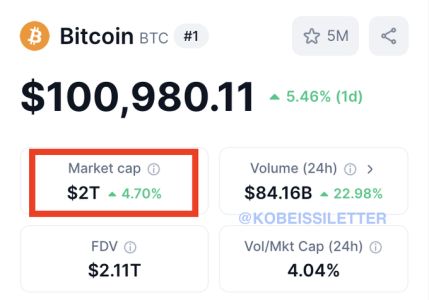In a groundbreaking milestone, Bitcoin has achieved a $2 trillion market capitalization for the first time, solidifying its status as one of the world’s most valuable assets. This historic achievement was reported by The Kobeissi Letter on X (formerly Twitter), which noted that the milestone occurred just five minutes after Bitcoin crossed the $100,000 price level.
According to Companies Market Cap, Bitcoin is now ranked as the seventh most valuable global asset, surpassing the likes of Tesla and Meta in market valuation.

Breaking Down Bitcoin’s $2 Trillion Milestone
Bitcoin’s journey to a $2 trillion market cap represents a pivotal moment in the evolution of cryptocurrencies. Here’s what it means:
Market Capitalization Explained
Market capitalization, or market cap, is calculated by multiplying the total circulating supply of Bitcoin by its current price. With Bitcoin trading above $100,000 and over 19 million coins in circulation, this milestone reflects both price appreciation and growing adoption.
Top Global Asset Ranking
At $2 trillion, Bitcoin has joined the ranks of the world’s most valuable assets, including:
- Gold
- Apple
- Microsoft
- Amazon
Bitcoin now sits at seventh place, surpassing several Fortune 500 companies and traditional financial instruments in valuation.
Key Drivers Behind Bitcoin’s Market Cap Surge
Bitcoin’s rise to a $2 trillion market cap is the result of several converging factors:
1. Institutional Adoption
The increasing involvement of institutional investors has played a critical role in driving demand. Hedge funds, corporations, and asset managers are allocating significant portions of their portfolios to Bitcoin, recognizing its value as a store of wealth and inflation hedge.
2. U.S. Spot Bitcoin ETF Approvals
Recent approvals of U.S. spot Bitcoin ETFs have created a new pathway for institutional and retail investors to access Bitcoin. The introduction of ETFs by financial giants like BlackRock and Fidelity has significantly boosted market liquidity.
3. Global Economic Conditions
Macroeconomic uncertainties, including inflation and currency devaluation, have prompted many investors to turn to Bitcoin as a reliable alternative to traditional assets.
Bitcoin’s Global Impact: A $2 Trillion Asset
Bitcoin’s newfound status as a $2 trillion asset has profound implications for both the cryptocurrency and traditional financial markets:
Enhanced Credibility
Crossing the $2 trillion threshold positions Bitcoin as a legitimate competitor to traditional financial instruments like gold and major equities.
Mainstream Adoption
This milestone is likely to accelerate the adoption of Bitcoin by governments, corporations, and retail investors worldwide.
Increased Scrutiny
With greater prominence comes increased regulatory attention. Governments and financial regulators are expected to intensify their oversight of Bitcoin’s role in the global economy.
Comparing Bitcoin to Other Major Assets
At $2 trillion, Bitcoin’s market cap is now larger than the total value of several multinational corporations. Here’s how it compares:
| Asset/Company | Market Cap |
|---|---|
| Gold | $13.2 Trillion |
| Apple | $3.15 Trillion |
| Microsoft | $2.6 Trillion |
| Bitcoin | $2 Trillion |
| Amazon | $1.75 Trillion |
| Tesla | $870 Billion |
Bitcoin’s ranking as the 7th most valuable global asset underscores its rapid growth and potential to rival traditional asset classes.
Challenges Ahead for Bitcoin
While Bitcoin’s $2 trillion market cap is a remarkable achievement, the road ahead is not without challenges:
1. Market Volatility
Bitcoin’s price remains highly volatile, which could impact its ability to maintain this market cap.
2. Regulatory Uncertainty
As Bitcoin gains prominence, regulatory scrutiny is expected to increase, potentially affecting its adoption and price stability.
3. Competition from Other Cryptocurrencies
Ethereum and other blockchain networks are rapidly evolving, offering unique value propositions that could compete with Bitcoin for market share.
What’s Next for Bitcoin?
As Bitcoin continues to break records, analysts predict further growth in its market cap and adoption. Key developments to watch include:
- Broader ETF Adoption: Expanding access to Bitcoin ETFs could bring more institutional and retail investors into the market.
- Global Regulatory Frameworks: Clearer regulations could boost confidence in Bitcoin as a legitimate investment vehicle.
- Technological Innovations: Advancements in Bitcoin’s network, such as scaling solutions and sustainability efforts, could enhance its value proposition.
Expert Opinions on Bitcoin’s $2 Trillion Market Cap
CryptoQuant CEO Ki Young Ju
Ju described Bitcoin’s milestone as a “validation of its role as the ultimate store of value,” urging investors to hold their positions amid growing institutional demand.
The Kobeissi Letter
The Kobeissi Letter highlighted the psychological significance of the $100,000 price level, noting that the achievement reflects a strong foundation for further growth.
Conclusion
Bitcoin’s ascent to a $2 trillion market cap is a testament to its growing acceptance and influence as a global financial asset. Fueled by institutional adoption, favorable regulatory developments, and macroeconomic factors, Bitcoin has solidified its place among the world’s most valuable assets.
While challenges remain, this milestone marks the beginning of a new chapter in Bitcoin’s evolution, with its potential to redefine the financial landscape becoming increasingly apparent.
To learn more about the innovative startups shaping the future of the crypto industry, explore our article on latest news, where we delve into the most promising ventures and their potential to disrupt traditional industries.
Disclaimer: The information provided is not trading advice, Bitcoinworld.co.in holds no liability for any investments made based on the information provided on this page. We strongly recommend independent research and/or consultation with a qualified professional before making any investment decisions.

